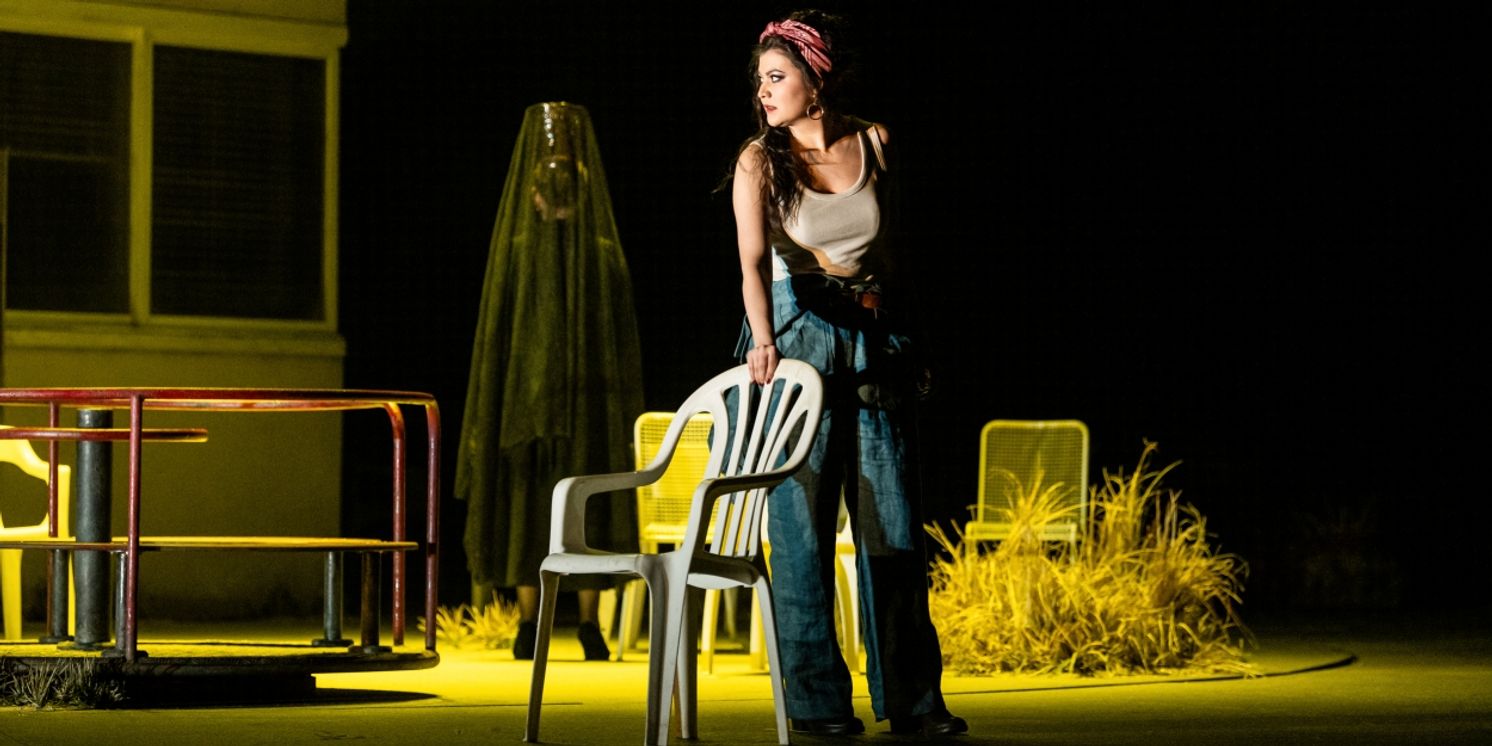Review: CARMEN, Royal Opera House
Aigul Akhmetshina commands the stage in this compelling new production

 We’re somewhere in those vast spaces in Spain that sprawl between the cities, where the air hangs heavy in the shimmering heat. You begin to get a read on the clothes, the kids’ bikes, the radio carried into the town square - the mid-1970s feels about right, the highwater mark of spaghetti western and 100 years on from the hostile reception the opera’s premiere received from a scandalised Parisian public.
We’re somewhere in those vast spaces in Spain that sprawl between the cities, where the air hangs heavy in the shimmering heat. You begin to get a read on the clothes, the kids’ bikes, the radio carried into the town square - the mid-1970s feels about right, the highwater mark of spaghetti western and 100 years on from the hostile reception the opera’s premiere received from a scandalised Parisian public.
There’s an enervating boredom settled amongst the men, sipping sangria, but that changes when the factory girls, in boiler suits and headscarves, knock off work. They’re all waiting for one especially - the raven-haired gypsy girl with the white T-shirt underneath, who sings a song, “Habanera” (of course), initially to the pre-teens and teens on the swings, intended not just as a lesson on love, but one on agency too. They won’t grow up to be pawed at as their elders are too often by the entitled local police. This Carmen is a dangerous free spirit who lives life on her own terms and fears nobody.
%20PIOTR%20BECZALA%20(Escamillo)%20KOSTAS%20SMORIGINAS%20ROH%20Carmen%2C%20%C2%A92024%20Camilla%20Greenwell_4638.jpg?format=auto&width=1400)
Damiano Michieletto’s new production captures the same vibe as his thrice revived Cavalleria Rusticana/Pagliacci double bill, sex and violence under a Mediterranean sun, unforgiving in the afternoon, but casting shadows fit for mayhem as it sets. Paolo Fantin’s set, on a slowly rotating revolve, suggests both the tumbleweeds of nothingness just beyond our vision, but also provides intimate spaces for human relationships to form and fracture. There’s a physical and psychological insularity that makes Carmen herself even more attractive, even more transgressive - and she knows the power that brings.
Russian mezzo-soprano, Aigul Akhmetshina, is cornering the market in big house Carmens at the moment, flying in from New York to sing the same part, but in a different show, in London. It’s not hard to see why. At 27, she’s exactly the right age for the doomed temptress, all high heels and deep cleavage and she has a voice that could charm the birds from the trees, finding the insecurity of the outsider behind the bravado of the sexpot.
She can really act too, bouncing between the solid but dull Don José (Piotr Beczala, also just in from the Met, also on top form vocally) and the swaggering matador Escamillo (Kostas Smoriginas) with the option of taking her chances with the good time girls in the nightclubs and dive bars always on her mind. You can see her fate coming long before the final blow lands and you wonder why so bright a woman, one so capable of escape walks into it, almost voluntarily. But that’s opera.
%20AIGUL%20AKHMETSHINA%20ROH%20Carmen%2C%20%C2%A92024%20Camilla%20Greenwell_3957.jpg?format=auto&width=1400)
Perhaps the most delightful singing all night comes from Olga Kulchynska as Micaëla, the woman who loves Don José, as dowdy as Carmen is glamorous, who warns him of a danger he can already perceive but not resist. She’s often trailed in her plaintive arias by a silent almost ghostly figure - the mother whom Don José deserted and who adopted her, ready with the Tarot’s death card to foretell the lovers’ destiny. Love triangles eh?
With so many great tunes to work with, Antonello Manacorda keeps his orchestra in check - we get the famous set pieces, but none overpower the drama nor provoke too long a period of applause that disrupts the carefully constructed tension. The chorus too have plenty to do but, aside from the odd fight and cheering for the heroes of the corrida, they too let the storytelling drive the production.
I suspect every traditionalist will find something with which to quibble in this bold interpretation (I wasn’t at all sure about the subtitles, jarring a little with what I heard sung in French) but the confidence of the vision is exhilarating and, in our black-eyed heroine strutting in black lingerie, we surely have the singer who will define the role over the next decade and beyond.
Carmen at the Royal Opera House until 31 May and in cinemas on 1 May and 5 May
Photo images: Camilla Greenwell
Reader Reviews
Videos

